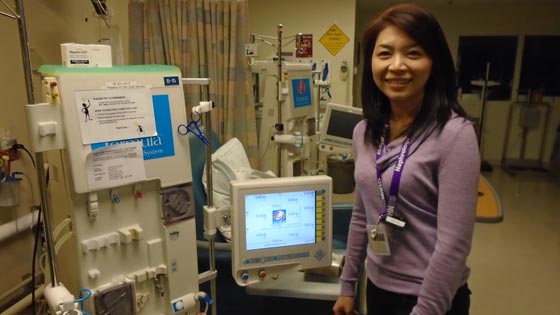
Dr. Nalinee Saiprasertkit, an international fellow from Thailand, pictured here with a hemodialysis machine in TGH’s hemodialysis unit. This machine is used by home hemodialysis patients.(Photo: UHN)
Medical staff from around the world come to the home dialysis program at Toronto General Hospital to learn how to teach dialysis patients in their countries to become more independent and informed about their treatment.
TGH's internationally renowned ExpLoRe Home Dialysis Program is the largest and most unique program of its kind in the world. Throughout the year, it hosts healthcare professionals from countries such as Thailand, Spain, Brazil and Lebanon.
"The number of end-stage renal disease patients in Thailand has been increasing dramatically over the past 10 years and has become a major public health issue, so improving quality of care in this group of patients is essential" explains Dr. Nalinee Saiprasertkit, a Clinical Fellow from Thailand, training at ExpLoRe.
"I'm here to learn more about how to implement and grow home dialysis program in my country"
ExpLoRe at home: giving patients control of their treatment
The ExpLoRe Home Dialysis program was developed at TGH to train international nephrologists and nurses, to educate and train patients to self-administer the two kidney dialysis options that can be done at home without direct medical intervention: peritoneal dialysis (PD) and home hemodialysis (HHD).
Advantages to the home option, in comparison to in-centre or hospital dialysis, include flexibility of treatments, minimal adverse reactions, improved energy and sleep, and lower rates of hospital admission and hospital stay.
"To me, it is a form of rescue; the patient is able to reclaim their life, to return to a more positive and wholesome way of living," says Rose Faratro, a registered nurse in the ExpLoRe program, of home dialysis.
"A better quality of life"
Dialysis, a treatment for people in the end stage of kidney failure, cleans the blood by removing waste and excess water using an external machine. During PD, this process is done through instilling clean fluid into the patient's abdominal cavity, collecting toxins, and draining them.
During HD, blood is taken out of the patient, cleaned by an artificial kidney, and returned to the patient.
"From a patient perspective, home dialysis allows a better quality of life," explains Dr. Emilie Trinh, one of ExpLoRe's local Fellows, visiting from Montréal for one year to expand her training on home dialysis.
"It gives patients independence and more knowledge of their care. For example, if a patient is getting a bit swollen, they know to take off more fluid during dialysis."
Pushing the boundaries on patient education
The reasons to select HHD or PD vary depending on the patient's age, demographic, desired length of dialysis training and lifestyle.
"It's really important to get the proper training for our patients, but also for the medical staff training these patients," explains Dr. Trinh, adding that she selected ExpLoRe because TGH has one of the largest cohorts of home HHD and PD patients.
"Patients with chronic kidney disease may be scared to take on the responsibility of their own care, but that fear may not always be justified. Proper education and training for these patients is crucial."
Dr. Trinh adds that at ExpLoRe, Dr. Chris Chan, Medical Director of UHN's Home Hemodialysis Unit, and Dr. Joanne Bargman, Director of UHN's Peritoneal Dialysis Program, ensure that the program "pushes the boundaries of patient selection for home dialysis."
"For example, in other programs, if they saw a patient who was very ill or a bit older, they might say this patient has to go for in- centre hemodialysis. Here, we really push that boundary and say, 'well let's try home dialysis.'"
Dr. Rory McQuillan, Education Coordinator for ExpLoRe, ensures that the fellows' individualized goals are met throughout their fellowship. These goals vary based on where knowledge and training is needed in different areas around the world.
Growing demand for dialysis
Dr. Saiprasertkit's training in the TGH program is for two years. When she returns to Thailand in November 2017, she expects to have the expertise necessary to share with her colleagues and to make home dialysis a leading option for chronic kidney disease patients in Thailand.
"The number of chronic kidney patients is increasing around the world and transplantation is limited," explains Dr. Saiprasertkit. "Not everyone can get a kidney, so lives depend on both PD and HD, which in my opinion are equal options in terms of quality of life."
The number of people requiring dialysis is growing by about 10 per cent a year. Currently, approximately 10,000 patients in Ontario are receiving dialysis.
